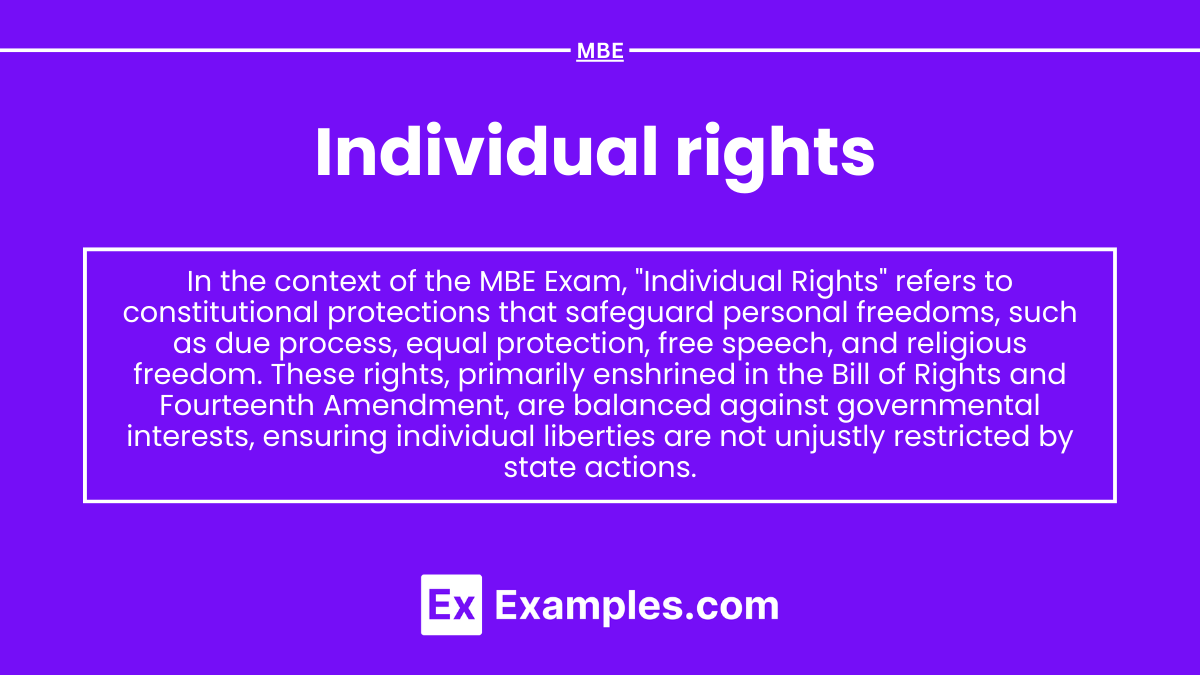Preparing for the MBE Exam requires a thorough understanding of individual rights, a fundamental aspect of constitutional law. Mastery of topics such as freedom of speech, equal protection, due process, and privacy rights is essential. This knowledge helps analyze legal scenarios, ensuring a comprehensive grasp of civil liberties and constitutional protections critical for exam success.
Learning Objective
In studying “Individual Rights” for the MBE Exam within Constitutional Law, you should gain a comprehensive understanding of the constitutional protections provided to individuals, including due process, equal protection, and freedom of speech, religion, and assembly. Analyze key Supreme Court cases shaping individual rights and evaluate doctrines such as strict scrutiny and intermediate scrutiny. Examine the role of the First, Fifth, and Fourteenth Amendments in protecting civil liberties. Explore how these principles apply in scenarios involving discrimination, criminal procedure rights, and privacy concerns, and apply your knowledge to accurately assess legal issues in MBE practice questions and hypothetical scenarios.
Scope and Limitations of Individual Rights Under the U.S. Constitution
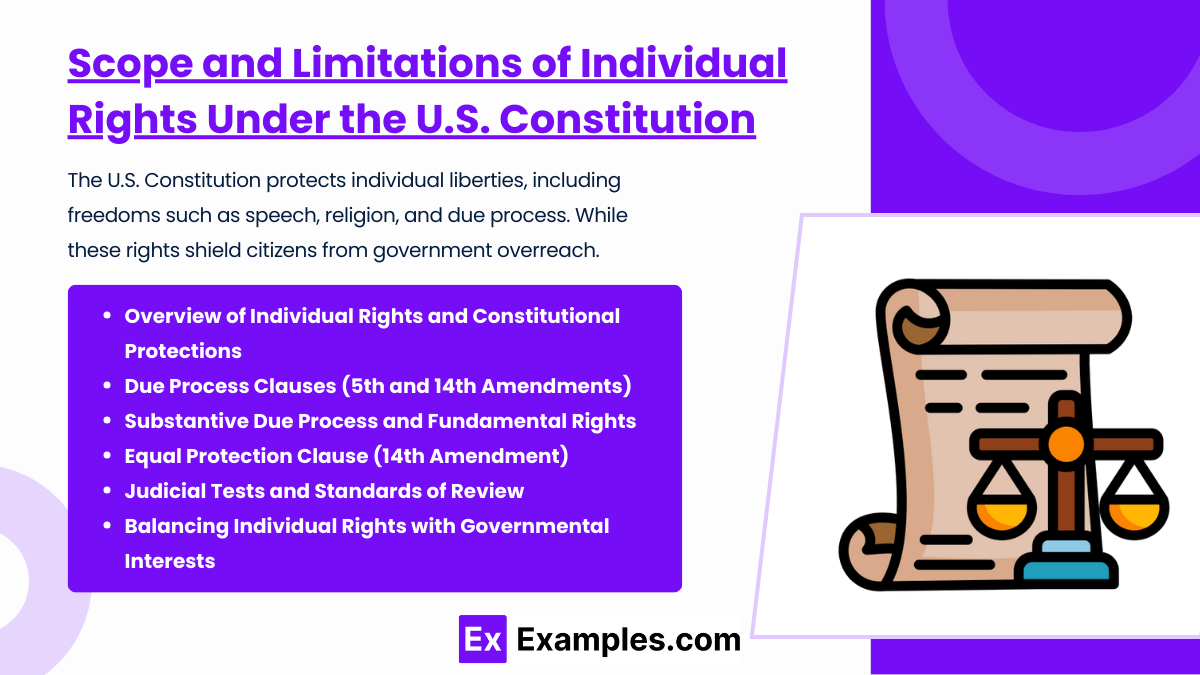
The U.S. Constitution protects individual liberties, including freedoms such as speech, religion, and due process. While these rights shield citizens from government overreach, they are not absolute and may be limited when compelling state interests, such as national security or public safety, arise. Judicial scrutiny ensures that any limitations are justified and narrowly tailored.
1. Overview of Individual Rights and Constitutional Protections
The U.S. Constitution, primarily through the Bill of Rights and various amendments, establishes and protects individual rights to shield citizens from governmental overreach. These rights include freedoms such as speech, religion, and assembly. Constitutional protections also extend to due process and equal treatment under the law. However, these rights are subject to interpretation and can be limited to balance public interests, such as safety and order, against individual freedoms.
2. Due Process Clauses (5th and 14th Amendments)
The Fifth and Fourteenth Amendments ensure that no person shall be deprived of “life, liberty, or property” without due process of law. Procedural due process focuses on the “how” of law enforcement, requiring fair procedures before government action, such as notice and a hearing. Substantive due process addresses the “what,” protecting fundamental rights from government interference unless a compelling interest justifies it. This includes personal autonomy and bodily integrity in areas such as family, marriage, and parenting.
3. Substantive Due Process and Fundamental Rights
Substantive due process extends to fundamental rights that are deeply rooted in American history and traditions. Courts subject laws affecting such rights to a high level of scrutiny to prevent arbitrary or unjust government actions. Examples include the right to marry, raise children, and make personal medical decisions. Laws impacting these rights must serve a compelling state interest and be narrowly tailored to achieve that interest without unduly infringing on individual liberties.
4. Equal Protection Clause (14th Amendment)
The Equal Protection Clause mandates that individuals in similar situations be treated equally by the law. This provision primarily aims to combat and remedy discrimination based on characteristics such as race, gender, religion, or national origin. Different levels of judicial scrutiny are applied depending on the classification in question. For instance, laws discriminating based on race are subject to strict scrutiny, while those involving economic distinctions are evaluated under the rational basis test.
5. Judicial Tests and Standards of Review
Courts use three main levels of scrutiny to evaluate laws that impact individual rights: (1) Strict Scrutiny applies when a fundamental right or suspect classification (e.g., race) is at issue, requiring a compelling government interest and narrow tailoring. (2) Intermediate Scrutiny applies to classifications such as gender, requiring an important government interest. (3) Rational Basis Review is the most lenient and applies when no fundamental rights or suspect classifications are involved; the law must merely have a rational connection to a legitimate government interest.
6. Balancing Individual Rights with Governmental Interests
While individual rights are fundamental to a democratic society, they are not absolute. Governments may impose limitations when pursuing compelling or legitimate interests, such as national security, public health, or safety. Courts weigh the government’s interests against the rights being restricted. For example, free speech can be limited in cases of incitement to violence, obscenity, or public safety concerns. This balancing act ensures that rights are protected without undermining societal order and welfare.
Free Speech and Religious Freedom
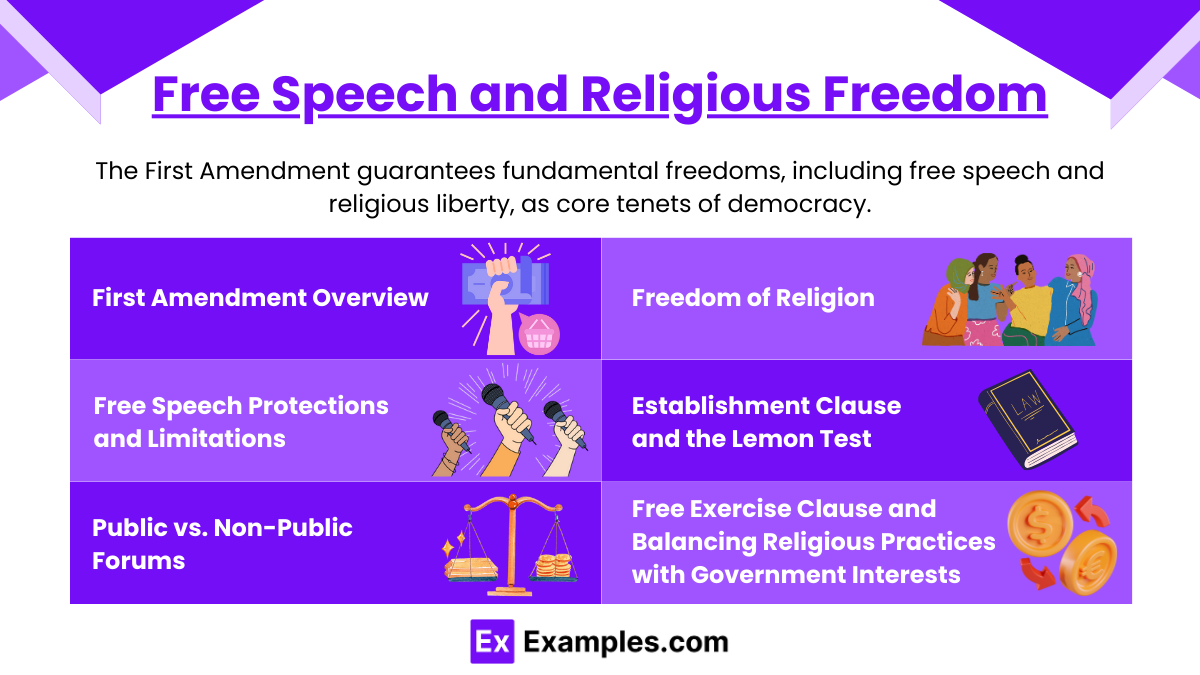
The First Amendment guarantees fundamental freedoms, including free speech and religious liberty, as core tenets of democracy. These rights ensure individuals can express their beliefs and practice their religion without undue government interference. However, the government can impose limits on speech and religious practices to protect public interests, such as security and public order. Balancing individual freedoms with these interests involves judicial scrutiny to ensure any restrictions are justified, narrowly tailored, and do not favor or discriminate against specific viewpoints or beliefs.
1. First Amendment Overview
The First Amendment of the U.S. Constitution guarantees freedoms concerning religion, expression, assembly, and the right to petition the government. It prevents the government from establishing a religion (Establishment Clause) and protects the free exercise of religion (Free Exercise Clause). Additionally, it ensures individuals’ rights to free speech, press, and peaceful assembly, forming a cornerstone of democratic society.
2. Free Speech Protections and Limitations
The right to free speech protects individuals’ ability to express themselves without government interference or regulation. However, this right is not absolute. The government may impose restrictions in specific contexts, such as speech that incites violence, obscenity, defamation, or speech in schools and public workplaces. Content-based restrictions are subject to strict scrutiny, requiring a compelling governmental interest and narrow tailoring to achieve that interest. Content-neutral regulations, such as restrictions on the time, place, or manner of speech, receive intermediate scrutiny.
3. Public vs. Non-Public Forums
The level of free speech protection depends on the type of forum where the speech occurs. Traditional public forums, such as streets and parks, provide the highest protection for speech. Limited or designated public forums, such as meeting halls, allow some regulation if it is viewpoint-neutral and reasonable. Non-public forums, such as government offices, may have more restrictions as long as the rules are reasonable and not based on viewpoint discrimination.
4. Freedom of Religion
The First Amendment protects religious freedom through two key clauses: the Establishment Clause and the Free Exercise Clause. The Establishment Clause prohibits the government from establishing an official religion or unduly favoring one religion over another. The Free Exercise Clause ensures individuals can practice their religion freely without government interference, unless there is a compelling governmental interest.
5. Establishment Clause and the Lemon Test
To determine if a law violates the Establishment Clause, courts often use the Lemon Test, established in Lemon v. Kurtzman. The test evaluates whether a law has a secular purpose, neither advances nor inhibits religion, and does not result in excessive government entanglement with religion. Laws failing any part of this test may be deemed unconstitutional.
6. Free Exercise Clause and Balancing Religious Practices with Government Interests
The Free Exercise Clause protects individuals’ right to religious beliefs and practices. While the government cannot prohibit religious practices outright, it may impose limits when there is a compelling interest, such as protecting public safety or health. Courts balance individual religious freedoms against these interests, ensuring that restrictions are not overly burdensome.
Privacy and Other Fundamental Rights
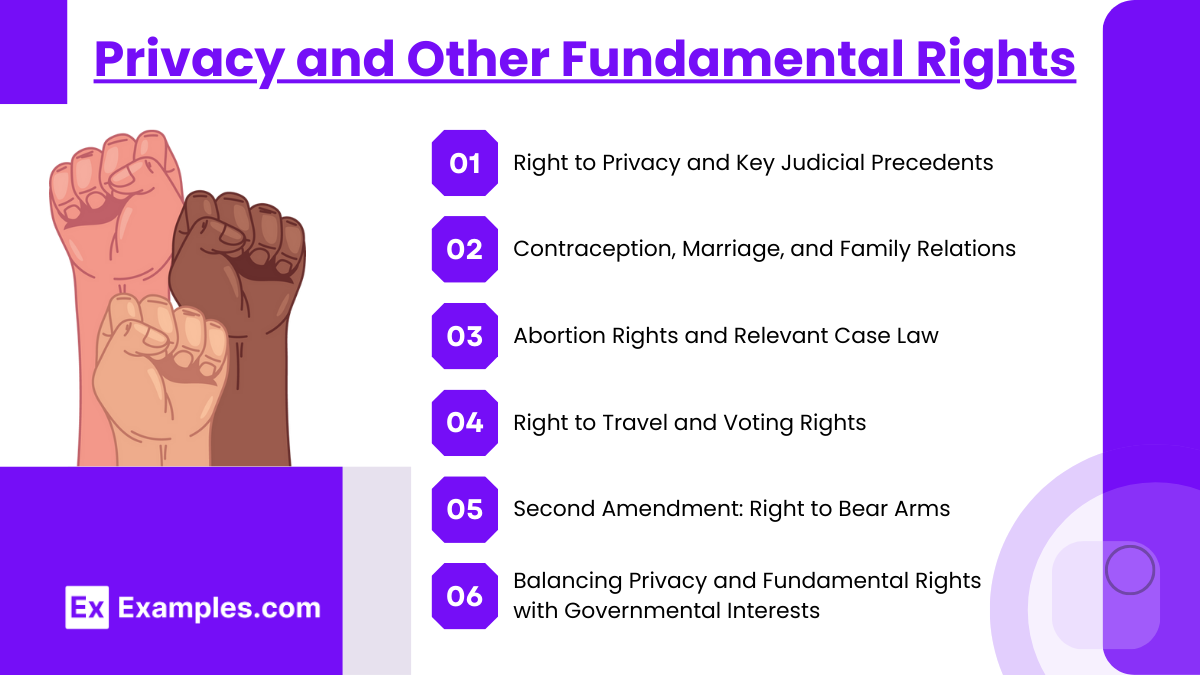
1. Right to Privacy and Key Judicial Precedents
The right to privacy, though not explicitly mentioned in the Constitution, has been interpreted as a fundamental right through a series of landmark Supreme Court decisions. This right stems from various constitutional amendments, such as the First, Third, Fourth, Fifth, and Ninth Amendments. Key cases, such as Griswold v. Connecticut, established the right to privacy in matters of contraception, while Roe v. Wade extended privacy rights to encompass a woman’s right to choose an abortion. The Court has consistently recognized privacy rights in personal, family, and bodily autonomy matters.
2. Contraception, Marriage, and Family Relations
The Supreme Court has consistently upheld the privacy rights of individuals concerning decisions on contraception, marriage, and family life. In Griswold v. Connecticut, the Court protected marital privacy regarding contraceptive use. In Loving v. Virginia, the Court struck down laws banning interracial marriage, recognizing marriage as a fundamental right protected by the Due Process and Equal Protection Clauses.
3. Abortion Rights and Relevant Case Law
The right to privacy extends to a woman’s right to make decisions about her own body, as established in Roe v. Wade and modified by later cases such as Planned Parenthood v. Casey. The Court determined that states could not place undue burdens on a woman’s right to seek an abortion before fetal viability. The balance of state interests and individual rights continues to evolve, with various regulations subject to judicial scrutiny to ensure they do not impose excessive restrictions.
4. Right to Travel and Voting Rights
The right to travel freely between states and the right to vote are recognized as fundamental rights. Restrictions on travel or voting must pass strict scrutiny, meaning the government must show a compelling interest for any limitations and that the measures are narrowly tailored. Cases such as Shapiro v. Thompson addressed residency requirements for welfare benefits, affirming the right to travel.
5. Second Amendment: Right to Bear Arms
The Second Amendment guarantees an individual’s right to keep and bear arms, subject to certain regulations. While the right is recognized as fundamental, the government can impose restrictions to protect public safety, such as background checks or limits on certain types of firearms. The Supreme Court has examined these rights in cases like District of Columbia v. Heller, recognizing an individual’s right to own firearms for lawful purposes, including self-defense.
6. Balancing Privacy and Fundamental Rights with Governmental Interests
Fundamental rights, including privacy, are not absolute and may be limited when compelling state interests arise, such as protecting public health, national security, or public safety. Courts apply various levels of judicial scrutiny, such as strict scrutiny for laws affecting fundamental rights, to ensure that any restrictions serve a legitimate government interest and are narrowly tailored to achieve their purpose without unnecessarily infringing on individual liberties. This careful balancing aims to preserve individual autonomy while protecting broader societal interests.
Balancing Individual Rights Against Governmental Interests
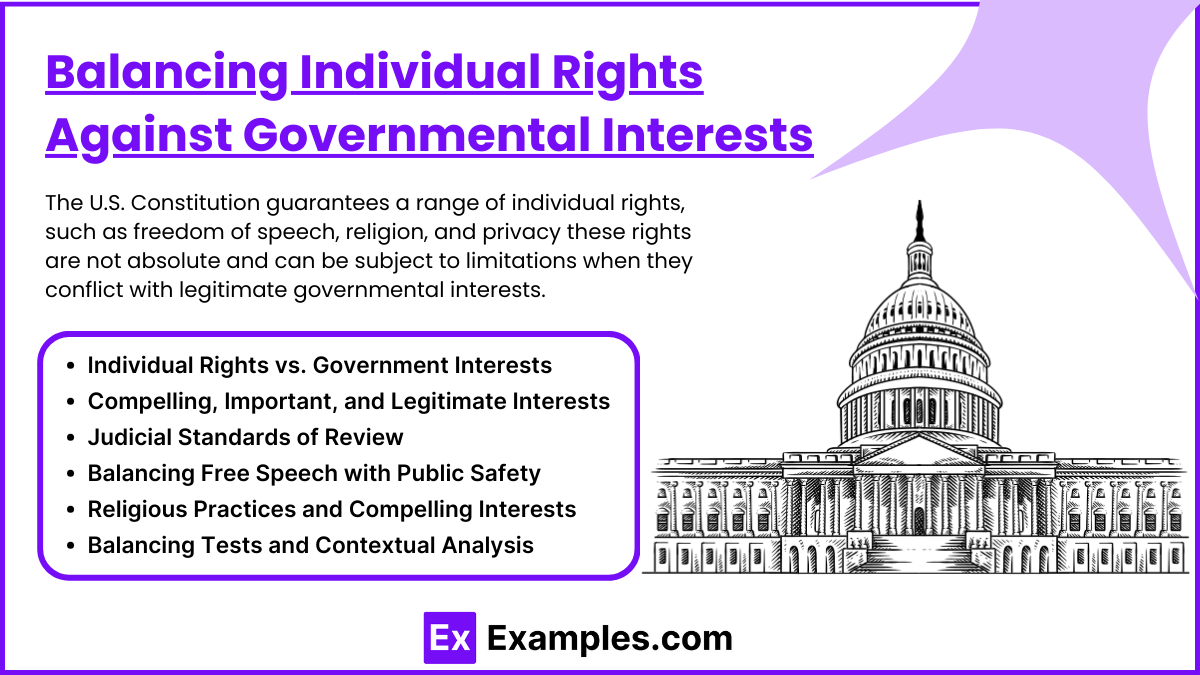
1. Individual Rights vs. Government Interests
The U.S. Constitution guarantees a range of individual rights, such as freedom of speech, religion, and privacy. However, these rights are not absolute and can be subject to limitations when they conflict with legitimate governmental interests. For example, the government may restrict free speech to protect national security, maintain public order, or prevent harm, but such restrictions must be carefully justified to avoid infringing unnecessarily on fundamental freedoms.
2. Compelling, Important, and Legitimate Interests
To justify restrictions on individual rights, the government must demonstrate a compelling, important, or legitimate interest, depending on the right being restricted. Compelling interests involve matters like national security, public health, or safety, while less fundamental rights may only require a legitimate interest. The degree of scrutiny applied by courts depends on the nature of the right and the government’s justification.
3. Judicial Standards of Review
Courts use different levels of scrutiny to evaluate whether government actions that limit individual rights are constitutional:
- Strict Scrutiny: Applied when a fundamental right is restricted or a suspect classification (such as race) is involved. The government must prove a compelling interest and that the law is narrowly tailored to achieve that interest.
- Intermediate Scrutiny: Used for classifications such as gender. The government must show an important interest, and the law must be substantially related to achieving that interest.
- Rational Basis Review: Applies when no fundamental right or suspect classification is involved. The government need only demonstrate that the law is reasonably related to a legitimate interest.
4. Balancing Free Speech with Public Safety
The right to free speech is highly protected but may be limited to prevent incitement to violence, obscenity, or threats to public order. For instance, speech that poses a “clear and present danger” or incites violence can be restricted. Courts weigh the value of the speech against the government’s interest in maintaining safety and order, ensuring that restrictions are narrowly tailored.
5. Religious Practices and Compelling Interests
While individuals have a right to freely practice their religion, certain practices may be limited if they conflict with compelling governmental interests. For example, religious practices that endanger public health, such as refusal of vaccinations during a pandemic, can be restricted if the government demonstrates that such restrictions are necessary to protect public safety.
6. Balancing Tests and Contextual Analysis
In applying these tests, courts assess the context and specific facts of each case to determine whether a government action strikes an appropriate balance between individual rights and governmental needs. The goal is to ensure that restrictions are neither overly broad nor unnecessarily restrictive. This balance maintains constitutional protections for individuals while allowing the government to fulfill its responsibilities to protect and serve the public.
Examples
Example 1: Equal Protection and Racial Discrimination
A state enacts a law that limits access to certain public services based on race. A challenge is brought under the Equal Protection Clause of the Fourteenth Amendment. The court applies strict scrutiny, requiring the state to prove a compelling interest and that the law is narrowly tailored. If the state fails to justify its interest, the law is struck down as unconstitutional discrimination.
Example 2: Free Speech in a Public Forum
An individual wishes to conduct a protest in a public park, a traditional public forum. The government seeks to impose restrictions on the time, place, and manner of the protest for public safety reasons. The court applies intermediate scrutiny, ensuring the regulations are content-neutral, serve a significant interest, and leave open alternative channels for expression.
Example 3: Right to Privacy in Reproductive Decisions
A state law imposes significant restrictions on access to contraception. A plaintiff challenges the law, citing the right to privacy under substantive due process. The court evaluates whether the law imposes an undue burden on individuals’ fundamental rights and whether there is a compelling government interest justifying the restrictions. If no such justification exists, the law may be deemed unconstitutional.
Example 4: Free Exercise of Religion vs. Public Health
A religious group challenges a state mandate requiring vaccinations for school children, citing the Free Exercise Clause. The court assesses whether the law serves a compelling state interest, such as public health and safety, and whether the restriction is narrowly tailored to achieve this interest. If the law is necessary and appropriately limited, it may be upheld despite the religious challenge.
Example 5: Content-Based Restriction on Free Speech
A local government enacts a law banning speech that criticizes government officials in public. A challenge is brought on First Amendment grounds, arguing that the law constitutes a content-based restriction on speech. The court applies strict scrutiny, requiring a compelling interest and narrow tailoring. If the government cannot justify its law, it is struck down as an unconstitutional restriction on free speech.
Practice Questions
Question 1
Which of the following tests is applied by courts when evaluating laws that affect a suspect classification, such as race?
A) Rational basis review
B) Intermediate scrutiny
C) Strict scrutiny
D) Balancing test
Answer: C) Strict scrutiny
Explanation:
Courts apply strict scrutiny when evaluating laws that involve suspect classifications such as race or laws that affect fundamental rights. To survive strict scrutiny, the government must demonstrate a compelling state interest, and the law must be narrowly tailored to achieve that interest. This is the most rigorous standard of judicial review.
Question 2
Under the Free Exercise Clause, a law that substantially burdens religious practices must be justified by:
A) A legitimate government interest
B) An important government interest
C) A compelling government interest
D) No government justification
Answer: C) A compelling government interest
Explanation:
The Free Exercise Clause protects individuals’ right to practice their religion. When a law substantially burdens religious practices, courts typically apply strict scrutiny, requiring the government to demonstrate a compelling interest and that the law is narrowly tailored to achieve that interest. This ensures that any burden on religious practices is justified and not arbitrary.
Question 3
The Equal Protection Clause primarily prohibits which type of discrimination by the government?
A) Discrimination based solely on economic status
B) Discrimination based solely on personal preferences
C) Discrimination based on race, gender, and similar classifications
D) Discrimination based on differing opinions
Answer: C) Discrimination based on race, gender, and similar classifications
Explanation:
The Equal Protection Clause of the Fourteenth Amendment requires the government to treat individuals in similar situations equally. It primarily addresses discrimination based on suspect and quasi-suspect classifications, such as race, gender, and national origin. Laws that differentiate based on these classifications are subject to different levels of scrutiny depending on the category, with race typically receiving the most stringent review.

